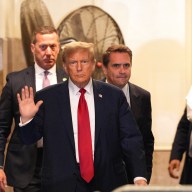TEGUCIGALPA, Honduras – The chief mediator in talks to end Honduras’ political crisis on Tuesday called both sides back to the table, a day after the ousted leader gave the interim government an ultimatum to reinstate him.
Costa Rican President Oscar Arias said talks will resume Saturday after two rounds of earlier negotiations failed to produce a breakthrough in the standoff over who is the legitimate leader of Honduras.
Arias also urged Manuel Zelaya, who was toppled by a military-backed coup June 28, to “be patient.”
“I understand the desire of President Zelaya to return and reinstate himself as president of Hondurans as soon as possible, but my experience tells me that one has to be a little patient,” said Arias, who won the 1987 Nobel Peace Prize for his efforts in ending Central America’s wars. “It’s not easy to get results in 24 hours.”
Arias said he would meet Tuesday with delegates from both sides to work out logistics before Saturday.
Zelaya, who is recognized by virtually all foreign governments, is clearly frustrated by the slow movement of negotiations.
“We are giving the coup regime an ultimatum,” Zelaya said Monday at a news conference in Nicaragua.
If the interim government does not agree to reinstate him at the next round of negotiations, “the mediation effort will be considered failed and other measures will be taken,” he said. He did not say what those measures would be.
Zelaya arrived Tuesday in Guatemala, where he met with his left-leaning counterpart, President Alvaro Colom.
“What is happening in Honduras could happen in other countries in the world,” Zelaya told reporters. “People are being repressed, suffocated by civilian puppets of the military that are trying to disrupt the democratic process.”
But he added: “I will return, I will return.”
At the swearing-in ceremony for a new foreign minister Monday, interim President Roberto Micheletti said his delegates are “ready for another meeting.”
Micheletti’s administration has insisted that Zelaya was ousted legally and has refused to bend on reinstating him despite international condemnation of the coup, including that of the United States.
Washington has clearly played an influential role in the negotiations: It was U.S. Secretary of State Hillary Clinton who invited Arias to mediate.
On Tuesday, thousands of Zelaya supporters marched from a university to the U.S. Embassy to demand Washington do more to force the interim government to back down.
“Hondurans are not dumb. Nothing moves an inch here without the approval of the U.S. Embassy,” said demonstrator Amilcar Espinosa.
U.S. State Department spokesman Ian Kelly said Tuesday everyone should trust Arias.
“We think that all parties in the talks should give this process some time, don’t set any artificial deadlines, don’t say, ‘If X doesn’t happen by a certain time, then the talks are dead,’ he said. “We have to give the process a chance and support what President Arias is doing.””
He added that the United States is calling “on all parties, particularly President Zelaya and the de facto regime to work together and come to a peaceful resolution that restores the democratic order,” which would mean “the restoration of the democratically elected president.”
Honduras’ Supreme Court, Congress and military say they legally removed Zelaya for violating the constitution. They accuse him of trying to extend his time in office. Zelaya denies that, saying he merely wanted to reform the constitution to make it better serve the poor.
Zelaya accused Micheletti’s government of using the talks “as a means to distract attention” from repression in Honduras, where protests for and against Zelaya’s return have filled the streets, though they have waned in recent days.
Members of Micheletti’s administration did not immediately respond to Zelaya’s comments
Zelaya and Micheletti, the congressional president who was sworn in to serve out the final six months of Zelaya’s term, met separately with Arias last week but refused to talk face to face.
Former Honduran Foreign Minister Carlos Lopez, a Micheletti representative at the talks, said his side had not ruled out the possibility of early elections as a way out of the crisis.
The interim government has been trying to restore life to normal this week in the impoverished Central American nation by lifting a nighttime curfew in place since the coup and successfully urging tens of thousands of Honduran teachers and students to return to class.
–
Associated Press writers Marianela Jimenez in Costa Rica and Juan Carlos Llorca in Guatemala contributed to this report.
















